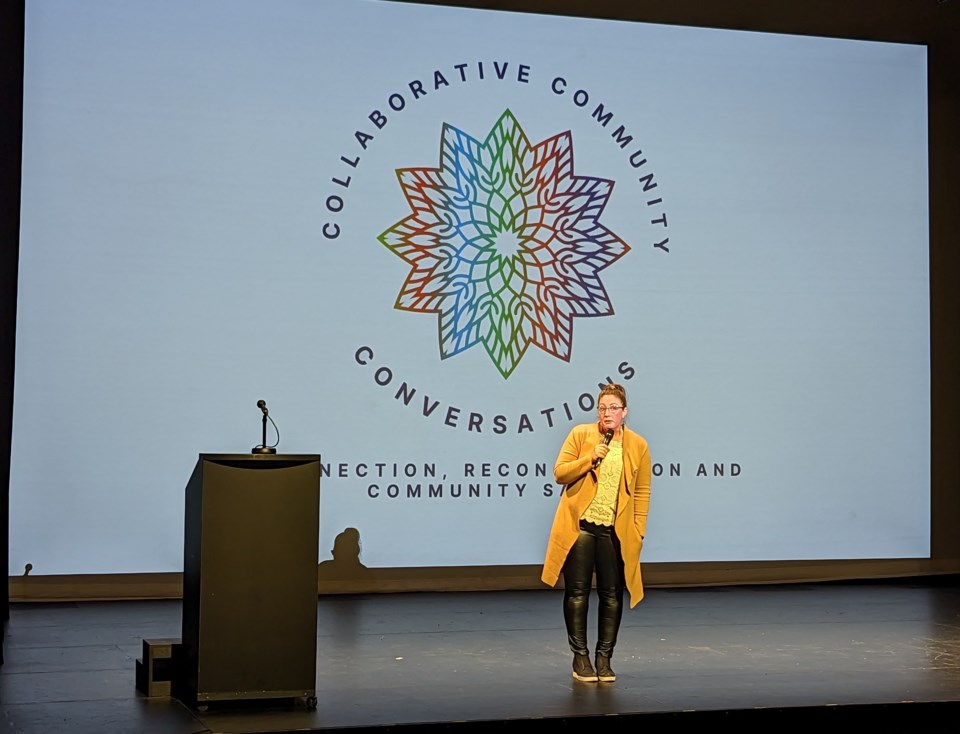An audience gathered at the Moose Jaw Cultural Centre on April 27 to hear speakers address topics such as systemic racism, the legacy of residential schools, intergenerational trauma, homelessness, and more, in a discussion that was unusually raw, authentic, and frank.
The event was a Collaborative Community Conversation organized by Lori Deets, chairperson of the Wakamow Aboriginal Community Association (WACA); Sarah Simison, executive director of the Moose Jaw Cultural Centre (MJCC); Gwen Fisher, head librarian at the Moose Jaw Public Library (MJPL); and Della Ferguson of Square One and Journey to Hope Moose Jaw.
The first speaker of the day was Elder Eugene Arcand, a residential school survivor from Muskeg Lake Cree Nation. His comments are covered in a separate MooseJawToday.com article. This article covers presentations from Dr. Amanda Gebhard, Heather Carter, and Michael Redhead Champagne.
Dr. Amanda Gebhard
Dr. Amanda Gebhard is a white settler scholar and assistant professor in the Faculty of Social Work at the University of Regina. She has more than 15 years’ experience in anti-racism education and has published widely on racism and whiteness in education in the Canadian prairies.
Gebhard is the co-author of White Benevolence (2022), a book about racism and colonial violence in the helping professions.
Her presentation had a highly academic tone. She used precise language as she navigated the difficult topic, provided documented examples, and referenced the work of other scholars. She outlined several social/cultural patterns of racism — outright denial, deflection, and white benevolence.
“I’m calling these patterns ‘white reluctance’ to refer to the many ways that racism is denied, avoided, minimized, and misconstrued,” she said.
“While forms of reluctance are not only practiced by white people, I use the term because ultimately, in this particular context, due to the history of settler colonialism, they are patterns that do work to elevate white dominance and reinforce negative stereotypes about Indigenous people, Black people, and people of colour.”
Gebhard said the patterns stand in the way of thoughtful dialogue. She said that naming, divesting from, and refusing such patterns must be part of the dialogue of building an equitable society.
Heather Carter
Heather Carter is a Métis woman from Prince Albert. Her Indigenous family history can be traced back to the founding of the province, she explained, but she passes as white.
“What I’m here to talk to you today about is the understanding that whiteness is currency,” she said. “Because of the way I look, I have been able to navigate systems very differently than my dark-skinned cousins, who are the children of my mother’s sisters.
“We have experienced together, as cousins, any number of situations where the experience I had, and the outcome and consequences for me, were very, very different. And the only explanation — because we come from the same community, the same neighbourhood, the same family — is that I look like the people with the power to hand out consequences.”
Carter’s work and studies focus on anti-oppressive leadership and practice of administration at post-secondary institutions. She has bachelor’s and master’s degrees and recently finished her doctoral studies, qualifying her toward becoming a Ph.D. candidate at the University of Regina.
Michael Redhead Champagne
The final speaker of the day was Michael Redhead Champagne, an Ininew public speaker, writer, community advocate, and on-screen personality.
Redhead Champagne spoke about how Indigenous knowledge, science, and values can help everyone, Indigenous and non-Indigenous alike, to live safer, happier, healthier lives. He highlighted an example from his work in Winnipeg with the Community Safety Host program, where Indigenous youth aging out of care were given the chance to speak on what they felt would make the process of accessing services and supports safe for them.
“And what they shared was about replacing security guards, who are too often vehicles for judging and displacing people,” he explained. “We imagined, what if security guards took a warmer, Indigenous-oriented, community-based approach … and we’ve now been able to create a new type of employment.”
Redhead Champagne also spoke on intergenerational trauma. He acknowledged the tremendous harm that has been passed down, but also highlighted the intergenerational love and wisdom that Indigenous knowledge keepers kept safe despite what they went through, and which now help everyone to heal and recover.
“I was honoured to be asked to speak here today. I know today’s purpose is to facilitate stronger connections in the community, towards a safer community,” Redhead Champagne said. “I also know that folks here are looking seriously at how they can be partners in reconciliation.”
He added that he appreciated seeing Indigenous leadership on the event, and the support of non-Indigenous people for Indigenous leadership.
“I think that’s a good omen for the well-being of reconciliation in Moose Jaw.”




